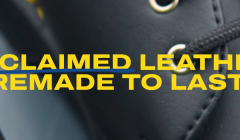
Dr. Martens champions sustainable fashion
Genix Nappa, a new material made of leather offcuts, aims to reduce waste

Caroline Casey, founder of the Valuable 500, revealed that whilst 90% of companies claim they are passionate about diversity and inclusion, only 4% of them employed someone with a disability.

On stage at AdWeek this year, Paul Polman was in discussion with Caroline Casey, founder of the Valuable 500 – a company that aims to put disability on the agenda of business leaders - to kickstart the business revolution for inclusion. Casey revealed that whilst 90% of companies claim they are passionate about diversity and inclusion, only 4% of them employed someone with a disability. As Casey said, the reality is that “if we get disability right, we get human inclusion right.”
Which is why IKEA Israeli’s new project, ThisAbles, feels so timely. The project has set out to make best-selling IKEA products more accessible and user-friendly for people with disabilities.
ThisAbles is a collection of 13 designs, “smart hacks”, that make existing IKEA items easier to use. From the “mega switch” to the “easy handle” and “friendly zipper”, all the designs are available online to be 3D printed anywhere in the world.
The project was created in partnership with Milbat and Access Israel, two not-for-profit social organisations, while McCann Tel Aviv created a campaign demonstrating how each design hack works.
The designs are the result of a collaboration between product engineers and a group of people with disabilities, to enable a better understanding of their needs and how IKEA products can meet them.
As Graham Pullin wrote in his book Design Meets Disability, “People are disabled by the society they live in, not directly by their impairment.” Through ThisAbles, IKEA are challenging this norm; opening up a world of design that people with disabilities might otherwise have been excluded from. They are designing for inclusion, ensuring that everyone feels comfortable in their own homes.
Visit ThisAbles website to find out more.
Looks like you need to create a Creativebrief account to perform this action.
Create account Sign inLooks like you need to create a Creativebrief account to perform this action.
Create account Sign in